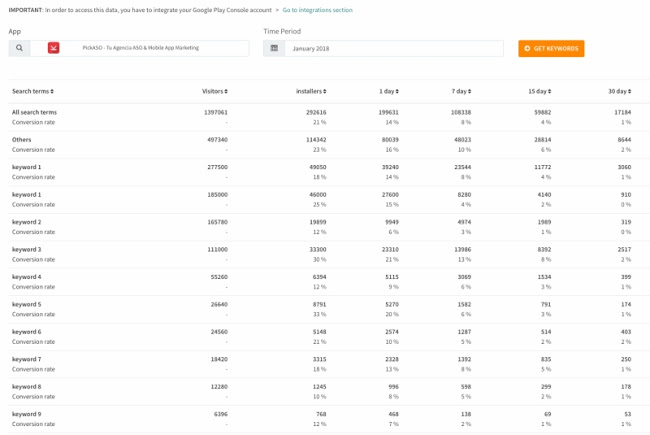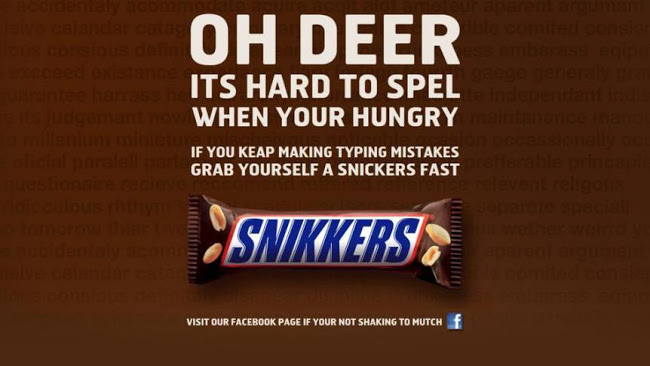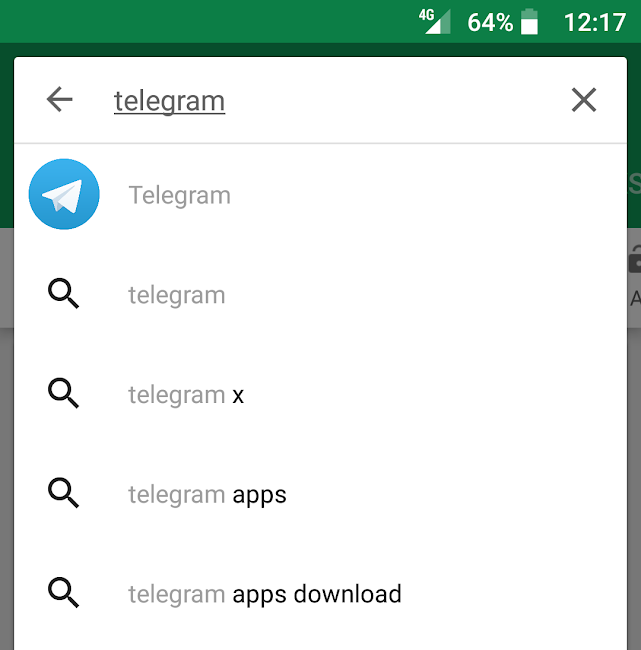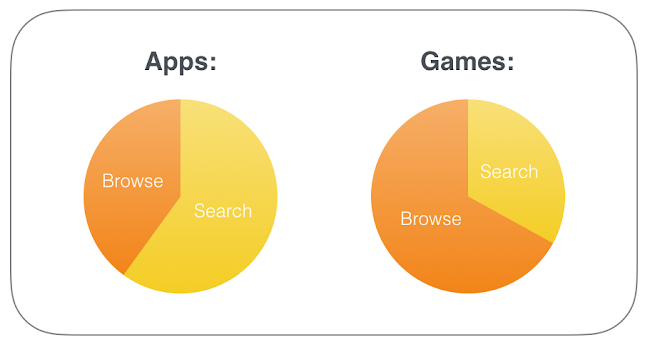Incipia blog
Deciphering Google Play Store Organic Search Data: 10 Insights You Can Get from the Installs per Keyword Feature
This guest post is written by Katerina Zolotareva, Marketing and Customer Success Manager at TheTool. TheTool is a powerful and easy-to-use platform that helps developers with ASO in over 90 countries. Katerina writes about App Store Optimization and Mobile Growth and gives actionable tips to improve app marketing strategy.
Cover image by Phiture / ASO Stack.
Anyone who has been dealing with mobile apps and ASO, knows that the app stores are quite restrictive as to the amount of data to provide to developers. In the Expert Study of ASO Factors and Trends that we carried out in the end of last year, one of the main trends highlighted by app marketing specialists was the prediction that Google will end up revealing the Installs per Keyword data - and it came true!
Just about three months ago, Google introduced the long awaited update, revealing to developers the data about keywords that bring installs to Android apps on Google Play Store. In fact, Google Play reveals the breakdown of Organic traffic that comes from Search (as a result of search results) and from Browse (while navigating in the store, that includes Categories, Top Charts, Featured apps, etc). While being pretty disruptive, this feature still stays in the beta version and only around 1% of developers can actually see the full data disclosure in their Google Play Console.
As you may (or may not) know, here at TheTool.io, we have found a way to extract and visualize the data for Installs per Keyword for any app or game, so now all mobile developers can view their report in TheTool, by integrating their Google Play Console.

Google Play Installs per Keyword Report with Dummy Data
Answering one of the most frequent questions we get - Installs per Keyword data is private and only available to the developer who has an access to the Play Console, so yet there is no possibility to spy your competitors and find out what keywords are bringing them organic installs :)
Installs per Keyword on Google Play Store: What to Expect
Let’s face it: Google’s Organic Installs per Keyword disclosure is not perfect. It doesn’t yet allow us to separate and analyze search data per country (we see the keywords in all languages all together), and for most of the apps not that much data is available: “Others” category typically hides 65-85% of all the keywords that don’t have enough installs to isolate them.
Technically, so far this data has just made the rich more rich, and the poor more poor. That said, the bigger the app, the more insights it will get about the keywords that bring installs. For large apps with high volume of installs, the “Others” category accounts for 40% to 60% of all organic search installs volume, while for some apps (the BIGGEST ones) it can even be as low as 12% (and the disclosure is available for over 350 keywords).
Smaller apps, however, are getting much shorter lists of app keywords, including mostly the branded keywords, and the rest of search terms are included in “Others” category that in these cases, accounts for nearly 90% of all app downloads.
Better ranks lead to more keywords disclosure
There is always more data available for the apps that have high search rankings for generic search requests. Two apps from the same vertical can have absolutely different data in their reports - and, statistically, the better are the ranks for generic search requests, the more detailed the reports and more keywords are disclosed.
Nevertheless, little data is better than no data. We were able to analyze Installs per Keyword for some apps while working with our clients at PickASO, and found some interesting patterns that will definitely help developers and marketers in improving their search visibility strategy.
10 Insights from Google Play Installs per Keyword Data
During these 3 months that the feature has been out, we were able to gain some insight into the organic search data from Google Play. Even though this feature provides the data that is still widely incomplete and imperfect, it certainly does shed a light on some concepts that are important for ASO, as to what share of the installs pie is actually attributed to Search, what keywords perform better in terms of Conversion Rate to install and Retention, and as well some interesting facts about the search habits of mobile users.
Here is what we found out:
Insight #1: Search requests with long-tail keywords exist, and in fact, are very common
Here is the truth: 60% to 75% of the keywords that we see in Google Play Installs per Keyword report, are long-tail. And it goes this way for both big and smaller apps.
We have always been promoting long-tail keyword strategy: even though long-tail combinations have less traffic than generic search terms, overall it is easier to rank for them, and thus, with better visibility, long-tail keywords have a potential to bring higher volume of installs altogether than generic ones.
Insight #2: Over the half of app installs come from branded keywords
Branded keywords (included brand misspelling), on average, bring 55-60% of installs. Given that the brand name always appears in the App Title, it is quite logic that we see big volume of installs for branded keywords (if the brand is strong), due to the usually high rankings for brand name in search results.
Insight #3: Branded keywords are misspelled more often that you think
You won’t believe how many ways there are to misspell your brand name, until you see the Installs per Keyword report. As we said earlier, in general branded keywords bring over the half of all app installs, and usually have enough volume of installs to be isolated and included into Google’s report.
Keeping your brand name short and easy to spell is more than just a recommendation, but still - even for the shortest brand names there would be 5 or more ways to misspell them. The good news, however, is that even though the name is misspelled, the users will find your app anyway.

Insight #4: Relevancy of the keywords really matters (in terms of Conversion Rate & Retention)
Observing the conversion rate to install on organic search data report, we have found out that the more relevant the search - the higher is the CR to install and the higher the User Retention. Moreover, long-tail search requests (that are usually more specific) often have higher CR than generic search terms.
Insight #5: Branded keywords show the best Conversion Rate to install
Following the previous insight, as expected, search terms with brand keywords show the highest Conversion Rate to install - on average, over 46% and up to 55%. Definitely deserves an extra effort to optimize the App Title and ensure the Top 1 rank for your brand name.
Insight #6: You are very likely to get installs for competitor brand name search
While working with our clients, we came across many apps that get installs for search terms that include a brand name of a competitor app. On average, around 10% of the installs can be coming from competitor’s brand name search, and in some cases, this share goes up to 35%-40% of installs.
Why does this happen? Here is the screenshot of the search results page from Google Play. Easy to notice that the carousel of related apps is displayed right under the main search result, pushing the rest of the apps below the fold. Therefore, if the user visit the listing of one of the related apps through competitor search, and downloads an app, these installs will be attributed to competitor brand name as a search term.
Take a look at the image below - it’s very possible that Reddit is getting installs for “telegram” search term, and Uber gets organic downloads for the keyword “blabla car” - which is also a great example of misspelling ;)
Insight #7: Suggestions are important
At least 15-20% of keywords revealed in Google Organic Search Data reports, are actually derived from suggestions. How do we know? Search term includes full App Title (consisting sometimes of 5-7 keywords), keywords with symbols (: or -), or even search requests with emoji (yes, we were surprised, too)!

Insight #8: Some users search for apps by publisher name or package name
Sounds strange, but sometimes Google’s organic Installs per Keyword report includes search terms starting with pname: and pub: followed by package name or publisher (developer name). If you have any more information about this, please get in touch and let us know :P We want to solve this mystery!
Insight #9: Search isn’t always the dominant source of organic installs
Wide belief that 50% to 60% of organic installs come from the search, is not always the case. For some apps (and mostly in the case of games), organic installs attributed to search are around 33%, and can be as low as 3-10%.

Interesting fact: “Search will take a smaller portion of the organic installs pie” was one of the predictions for 2018 from various ASO experts in our study!
Insight #10: What about Browse?
Some questions, though, are still around: what to do if you are not yet in Google’s beta? How to find out what share of organic installs pie in their case are attributed to Search and Browse?
Very easy - when you get the total number of Installs coming from Search in TheTool, deduct it from the total number of organic installs from the Acquisition Report in your Google Play console to get the total number of installs from Browse.

BTW, Soon we will add Browse downloads data to our report, too!
To sum up: Organic Search Install data for ASO
Even though most of the data is still hidden, Google’s Installs per Keyword Report has shed a light onto some KPIs that hungry for data marketers have been looking for. Game developers will find it interesting that sometimes Search rankings matter less than Browse. Those who still don’t work with suggested and long-tail keywords will hopefully change their minds. And finally, one of the most important takeaway - the relevance of the keyword matters way more than the traffic it has - for both Conversion rate to install and User Retention.
There is no point chasing just the high-volume head-tail keywords - an intelligent use of keyword suggestions and working with relevant keyword combinations, together with strengthening brand name would lead your app to success on Google Play Store.
Meanwhile, we are waiting for Apple to reveal the downloads per keyword data.
Good luck with optimizing!
If you find these insights interesting, share them with your friends and colleagues!
Categories
Tags:
- A/B testing
- adjust
- advertising
- adwords
- agile
- analytics
- android development
- app analytics
- app annie
- app development
- app marketing
- app promotion
- app review
- app store
- app store algorithm update
- app store optimization
- app store search ads
- appboy
- apple
- apple search ads
- appsee
- appsflyer
- apptamin
- apptweak
- aso
- aso tools
- attribution
- client management
- coming soon
- design
- development
- facebook ads
- firebase
- google play
- google play algorithm update
- google play aso
- google play console
- google play optimization
- google play store
- google play store aso
- google play store optimization
- google uac
- google universal campaigns
- idfa
- ios
- ios 11
- ios 11 aso
- ios 14
- ios development
- iot
- itunes connect
- limit ad tracking
- ltv
- mobiel marketing
- mobile action
- mobile analytics
- mobile marketing
- monetization
- mvp
- play store
- promoted iap
- promoted in app purchases
- push notifications
- SDKs
- search ads
- SEO
- skadnetwork
- splitmetrics
- startups
- swift
- tiktok
- uac
- universal app campaigns
- universal campaigns
- user retention
- ux
- ux design